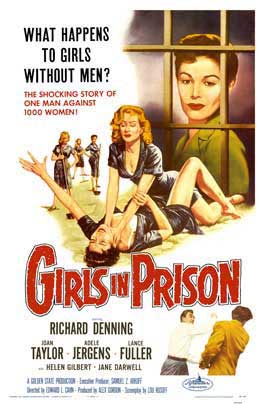Serendip is an independent site partnering with faculty at multiple colleges and universities around the world. Happy exploring!
Hummingbird's blog

The Eroticization and Objectification of Female Inmates


I was first struck by the eroticization of female inmates when I was researching images of female offenders for Barb’s vision class, but it wasn’t until I saw the “sexy prisoner” costumes that I thought more carefully about the subject. A Google search of “women in prison” turns up a number of movie posters for pornographic or erotic films set in prison. That such a serious and life altering experience could be reduced to a sexual spectacle made me cringe.

Frustrated.
I found the play we read for class today ("Footfalls") incredibly silencing and frustrating because I couldn't understand what was happening and what I could take from it. When I read the play last night, I got angrier and angrier because I felt like I was being shut out. I hoped the experience of watching the play might be more enlightening, but was disappointed to realize I felt just as confused about the play at the end of it. I felt dumb for having to ask, especially because the attitude I got from Mark was that the theme was obvious – and for me, that definitely wasn't the case. I also didn't find his explanation of the actual happenings of the play helpful because I wanted to know what that meant.
I wanted this experience to be a learning experience for me. Listening to Mark and Katherine's explanations of their process and their thoughts on silence, I was really hopeful for a breakthrough in the play – instead, I struggled to connect their thoughts on silence back to what I was viewing in the play. I still don't know what the theme of the play even is.

Some Thoughts...
Throughout high school and college, I've used writing as a form of personal expression. Personal essays have been my way of coming to moments of self discovery and reflection. I don't often think of my creative writing pieces, at least, as for some purpose other than the personal. On the other hand, when reading the work of others I find myself consciously and subconsciously making connections back to the text. I expect the texts to help me improve or learn in some way and I often expect that growth or understanding to come immediately.
It's hypocritical of me to expect to have to do something after I read these trauma novels, or Wideman's memoir about his brother. Perhaps, in regards to my own writing, I'm simply being selfish because I don't expect others to need to understand my work in some significant way – the writing process has always been about just that: the process. However, it's also selfish of me to assume that other writing is for my benefit – and not the work of someone who thinks in much the same way I do about the process. I've been struggling with the idea that perhaps what we need to do after reading these heavy works is to step back and let them sit with us when what I want to do is take some kind of action.

Stop and Frisk Policy and the New Jim Crow
This video was something a friend shared via facebook last night that related really deeply to my Memo topic, so I wanted to share it with you.
(http://www.youtube.com/watch?v=7rWtDMPaRD8&feature=player_embedded)

Prisons and Schools – Images
Like Owl, I went to a huge high school, so I'm including a video that was made of my school a few years before I went. I think it gives a fairly good sense of the scale of the school, but it's also interesting because of the similarities and differences to prison. The security guard checking people in, for example, is more similar to prisons – and in fact, after this video was made, scanners were installed at the entrance to the school so that students had to scan in or out of the building to track attendance. Unlike prisons, though, movement of students in the hallways and common spaces was fairly unrestricted.
http://www.youtube.com/watch?v=mun_xeznxT0
Next I wanted to share a fairly well known media representation of prison – the women's prison in the musical Chicago:
http://www.youtube.com/watch?v=xqV7HOVOPLE
And finally, I found two images – one of a school building and one of a prison building. Which one do you think looks more forboding?



Tired
I'm beginning to feel all written out – and we're not even halfway through the semester. I suppose, mostly, it's because I feel like my voice has been overused of late. When I'm not speaking, my blog posts are speaking for me. When I'm staying silent in class, I'm still, somehow, making a statement. I feel as though I'm never truly silent. Sommer talks a lot about silence as a way "ethnic" writers draw a line and mark where they need to be respected. Rigoberta says, "I'm still keeping secret what I think no-one should know," and reminds us who really has the power in her novel. But I feel we're not doing enough of that in our classroom. Last week, HSBurke said she thought it was ironic that in a class about silence we were "ALL SO LOUD." I agree. As I work on becoming a better listener, I want to also work on being a better person of silence. During our lunch meeting on Friday, when icouldntthinkofanoriginalname mentioned that she felt we shouldn't feel pressured to speak about personal topics, but that there is value in sharing, I wondered the opposite. Isn't there also value in not sharing?
I'd like to follow the lead of Jesusa Palancares, quoted in Sommer's introduction, "Advertencia/Warning" and simply say, "Fuck off, now. Go away and let me sleep."

Offending Women
I had a hard time reading Offending Women, not because of the level of it's cohesiveness or vocabulary, but because of how angry it made me. The examples Haney gave of the treatment women faced at Alliance made me question how they could be justified in continuing thier program. Though I'm sure living in a house with few restrictions was far more comfortable than living in a prison, the verbal and mental abuse the women faced was uncalled for and unjustified in my opinion.

Thoughts and Feelings Regarding our Trip
Something about yesterday’s trip made me feel as though I was on the verge of tears all day. I had a hard time understanding it – especially because when I explained what happened to friends I said, “Well, it was just a tour of some of Philly’s murals and of Eastern State Penitentiary – and people do that all the time.”
I was feeling a lot of things during the trip. Something about guided tours has always made me uncomfortable, I suppose, because they make me feel like an outsider (it’s ironic that I work as a tour guide here!). This particularly struck me during our trolley tour because there was such a strong sense both of being in a fishbowl and of viewing the world outside as an aquarium scene. I also felt emotional because of the murals and their meaning for those who were involved (particularly, this is relevant when looking at the memorial murals). I was struck by the impact on the community that our tour guide stressed because I felt in many ways he was over emphasizing it. I could see that there was no graffiti on the murals, but I also wondered why we were looking at graffiti simply through the lens of it as a negative thing (in this sense, the artist wall we saw covered in intricately designed tags was beautiful and I viewed it as a positive addition to the community, even if it wasn’t a sanctioned mural).

Stop and Frisk – A Matter of Race
I saw this video over the summer and it really affected the way I view arrests and policing in cities. I think in many ways it relates back to "The New Jim Crow" readings we did. I'd love to hear any thoughts you have in the video – it's not too long, and definitely worth watching.


